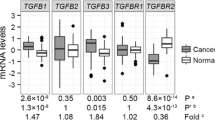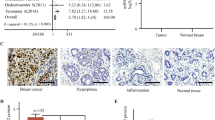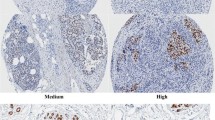Abstract
Objective
Transforming growth factor β1 (TGF-β1) is a multifunctional cytokine that may play an important role in tumor development and progression.
Methods
We evaluated gene expression patterns of TGF-β1 and its receptors [transforming growth factor β type I receptor (TβR-I) and transforming growth factor β type II receptor (TβR-II)] in tumor tissue from patients with breast cancer or with benign breast diseases (BBD) and adjacent normal tissue from the patients with breast cancer. Included in the study were 527 breast cancer patients and 213 BBD patients who participated in the Shanghai Breast Cancer Study.
Results
The expression levels of the TGF-β1, TβR-I and TβR-II genes in breast tissue were quantified using real-time PCR. TβR-II expression in cancer tissue was decreased by over 50% as compared to either adjacent normal tissue from the same patients or benign tumor tissue from BBD patients (p<0.001). TGF-β1 expression was lower by approximately 20% in cancer tissue compared to adjacent normal tissue (p=0.14) or to benign tumor tissue (p=0.002). Although TβR-I expression was also reduced in cancer tissue compared to adjacent normal tissue, or benign tumor tissue, the magnitude of the reduction was less apparent than that for TβR-II. Compared to patients with the lowest tertile value for TβR-II, patients with median tertile value for TβR-II had more favorable overall survival (HR 0.47, 95% CI 0.27–0.85) and disease-free survival (HR 0.65, 95% CI 0.39–1.06). No apparent associations, however, were observed between TGF-β1 or TβR-I expression and overall or disease-free survival.
Conclusion
The results from this study support the hypothesis that a decreased level of TβR-II gene expression, and thus reduced TGF-β1 sensitivity, is related to breast tumor progression.
Similar content being viewed by others
References
Bachman KE, Park BH. Duel nature of TGF-beta signaling: tumor suppressor vs. tumor promoter. Curr Opin Oncol. 2005;17:49–54.
Elliott RL, Blobe GC. Role of transforming growth factor Beta in human cancer. J Clin Oncol. 2005;23:2078–2093.
Derynck R, Akhurst RJ, Balmain A. TGF-beta signaling in tumor suppression and cancer progression. Nat Genet. 2001;29:117–129.
Caestecker MP, Piek E, Roberts A B. Role of transforming growth factor-β signaling in cancer. JNCI. 2000;92:1388–1402.
Benson JR. Role of transforming growth factor beta in breast carcinogenesis. Lancet Oncol. 2004;5:229–239.
Reiss M, Barcellons-Hoff MH. Transforming growth factor-beta in breast cancer: a working hypothesis. Breast Cancer Res Treat. 1997;45:81–95.
Travers MT, Barrett-Lee PJ, Berger U, et al. Growth factor expression in normal, benign, and malignant breast tissue. Br Med J (Clin. Res. Ed). 1988;296:1621–1624.
McCune BK, Mullin BR, Flanders KC, et al. Localization of transforming growth factor-beta isotypes in lesions of the human breast. Hum Pathol. 1992;23:13–20.
Barrett-Lee P, Travers M, Luqmani Y, et al. Transcripts for transforming growth factors in human breast cancer. Br J Cancer. 1990;61:612–617.
Coombes RC, Barrett-Lee P, Luqmani Y. Growth factor expression in breast tissue. J Steroid Biochem Mol Biol. 1990;37:833–836.
Gobbi H, Arteaga CL, Jensen RA, et al. Loss of expression of transforming growth factor beta type II receptor correlates with high tumour grade in human breast in-situ and invasive carcinomas. Histopathology. 2000;36:168–177.
Buck MB, Fritz P, Dippon J, et al. Prognostic significance of transforming growth factor beta receptor II in estrogen receptor-negative breast cancer patients. Clin Cancer Res. 2004;10:491–498.
Mizukami Y, Nonomura A, Yamada T, et al. Immunohistochemical demonstration of growth factors, TGF-alpha, IGF-I and neu oncogene product in benign and malignant human breast tissues. Anticancer Res. 1990;10:1115–1126.
Gorsch SM, Memoli VA, Gold LI, et al. Immunohistochemical staining for transforming growth factor beta 1 associates with disease progression in human breast cancer. Cancer Res. 1992;52:6949–6952.
Dublin EA, Barnes DM, Wang DY, et al. TGF alpha and TGF beta expression in mammary carcinoma. J Pathol. 1993;170:15–22.
Murray PA, Barrett-Lee P, Travers M, et al. The prognostic significance of transforming growth factors in human breast cancer. Br J Cancer. 1993;67:1408–1412.
Gao YT, Shu XO, Dai Q, et al. Association of menstrual and reproductive factors with breast cancer risk: results from the Shanghai Breast Cancer Study. Int J Cancer. 2000;87:295–300.
Schnitt S, Connolly J. Pathology of benign breast disorders. In Harris JR, Lippman ME, Morrow M, and Osborne CK, eds. Diseases of the Breast. Philadelphia(PA): Lippincott Williams & Willkins. 1999; 75–93.
Shu XO, Gao YT, Cai Q, et al. Genetic polymorphisms in the TGF-beta 1 gene and cancer survival: a report form the Shanghai Breast Cancer Study. Cancer Res. 2004;64:836–839.
Forrester E, Chytil A, Bierie B, et al. Effect of conditional knockout of the type II TGF-beta receptor gene in mammary epithelia on mammary gland development and polyomavirus middle T antigen induced tumor formation and metastasis. Cancer Res. 2005;65:2296–2302.
Bustin SA. Quantification of mRNA using real-time reverse transcription PCR(RT-PCR): trends and problems. J Mol Endocrinol. 2002;29:23–39.
Walker RA, Gallacher B. Determination of transforming growth factor beta 1 mRNA expression in breast carcinomas by in situ hybridization. J Pathol. 1995;177:123–127.
Author information
Authors and Affiliations
Corresponding author
Additional information
This work was supported by a grant from the Science and Technology Commission of Shanghai Municipality (05JC14086), NIH grants RO1 CA64277 and RO1 CA90899 from the National Cancer Institute, USA.
About this article
Cite this article
Wang, W., Shin, A., Cai, Q. et al. Role of TGF-β1 and its receptors in breast carcinogenesis: Evaluation of gene expression patterns and clinical implications. Chin. J. Clin. Oncol. 4, 153–159 (2007). https://doi.org/10.1007/s11805-007-0153-1
Received:
Accepted:
Issue Date:
DOI: https://doi.org/10.1007/s11805-007-0153-1




